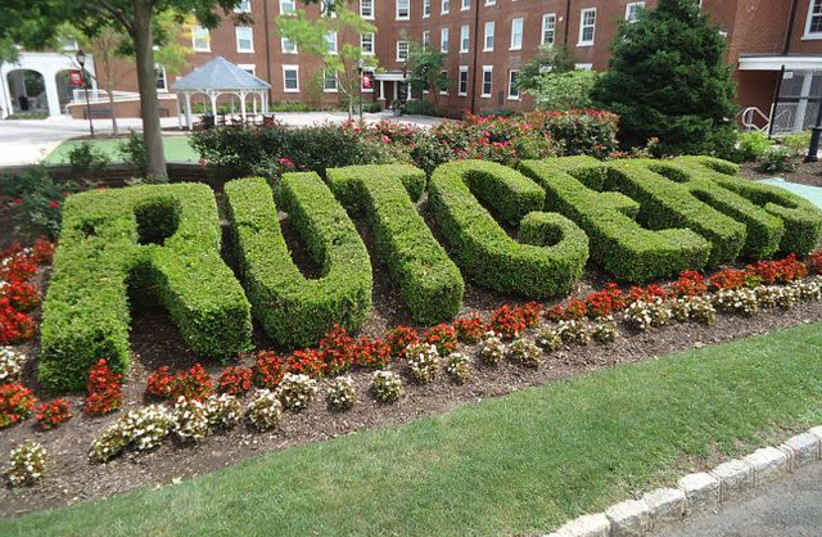(JTA) — Rutgers University likely failed to properly protect Jewish, Israeli, and pro-Palestinian students from a hostile environment after Hamas’ Oct. 7, 2023, attack that launched the war in Gaza, according to a new Title VI resolution agreement reached between the school and the U.S. Department of Education.
The agreement says that schools must review their anti-discrimination policies.
The agreement is the latest in a flurry of such deals to be reached with schools involving allegations of antisemitic harassment in the waning weeks of the Biden administration. The administration spent the better part of the last year immersed in dozens of antisemitism-related Title VI campus cases.
President-elect Donald Trump has vowed to shutter the Department of Education but has also promised a tougher line against universities for fostering antisemitism. If the department is closed, responsibility for enforcement of Title VI, which prohibits discrimination at federally-funded institutions, would move elsewhere, possibly to the Justice Department.
The Education Department’s Office of Civil Rights announced in its report on Rutgers that “the university likely operated a hostile environment based on national origin/shared ancestry in university programs or activities without redress,” adding that the school “subjected some students to discriminatory different treatment based on national origin.”

At Rutgers, federal investigators reviewed more than 400 reported cases of hostile environments for students during the 2023-24 academic year, 293 of which involved allegations of antisemitic or anti-Israel behavior.
These included social media threats made by students against members of AEPi, a Jewish fraternity, culminating in the fraternity’s members being egged; a professor allegedly supporting Hamas on social media; and Jewish students fleeing from a meeting with the school president after protesters broke out in anti-Zionist chants.
Allegations of anti-Palestinian harassment included reports of a Jewish law student group doxxing pro-Palestinian students and of university staff removing a Palestinian memorial on campus. (The Department of Education boiled all of the complaints, both antisemitic and anti-Palestinian allegations, down to three overarching Title VI investigations, all of which it lumped into its resolution agreement Thursday.)
Across four different New Jersey campuses, Rutgers leadership “appear not to have evaluated whether reported or investigated harassment created a hostile environment for such students,” investigators wrote. They added that university administrators “appear not to have taken effective action in response to the existence of a likely hostile environment” and faulted the school for addressing the reported incidents individually instead of examining their cumulative effect on campus.
Rutgers’ New Brunswick campus has the second-highest population of Jewish students of any public university in the country, according to Hillel International, which estimates its Jewish student body at more than 6,400 out of 36,357 total undergrads. Last year, hundreds of Jewish Rutgers students and staff decried what they described as an intimidating environment for Jews in an open letter.
Rutgers President plans to resign
Rutgers President Jonathan Holloway, who testified before Congress about his handling of campus antisemitism, has said he plans to step down at the end of this academic year. Congress has also launched a probe into the school’s handling of antisemitism.
As part of its agreement, the school agreed to similar steps as others before it: additional Title VI training for staff and campus police, a thorough review of all student conduct violations from the previous academic year, and a promise to “conduct listening sessions” and develop a campus climate assessment. This summer, Rutgers tried to incorporate the handling of protests into its new student orientation sessions, but those sessions were targeted by pro-Palestinian protests.
For the proposed listening sessions, the agreement names Rutgers Hillel and the school’s Jewish law student association — the same one pro-Palestinian students accused of doxing them — as relevant “affinity groups” to the campus Jewish community.
Rutgers currently participates in Hillel-led antisemitism training seminars; the school also previously announced an internal antisemitism task force, but unlike other universities, it has yet to release a report.
In December 2023, the school became one of a long list of universities to suspend its chapter of Students for Justice in Palestine; it re-upped the group’s suspension in August.
The agreement was praised by the New Jersey chapter of the American Jewish Committee, whose director, Rabbi David Levy, said the level of complaints against Rutgers was “abhorrent and unacceptable.”
“Rutgers must now make an unequivocal commitment to meaningful reform, which can be achieved without infringing on academic freedom and the right to assemble and protest,” Levy said in a statement.
“The Rutgers community stands firmly against discrimination and harassment in all its forms, and the university will always strive to strengthen the policies and practices that protect our students, faculty, and staff,” a spokesperson for the university told the Jewish Telegraphic Agency in a statement. “Rutgers is grateful to the Office of Civil Rights for its guidance.”
